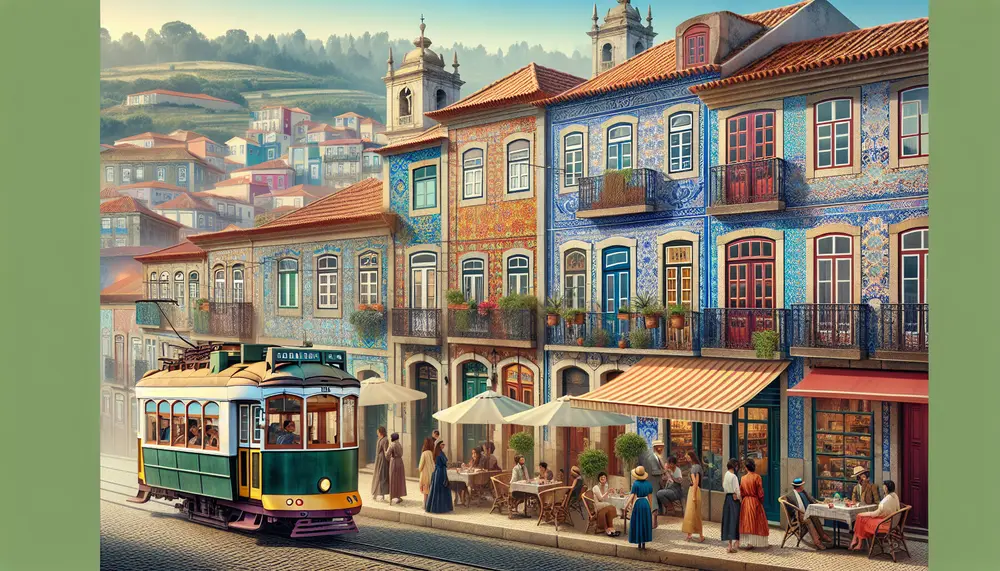Table of Contents:
Discover Portugal's Cultural Diversity
Portugal is a land of cultural diversity, where history and modernity blend seamlessly. This European gem offers a rich tapestry of influences, shaped by centuries of exploration and trade. From the Moorish architecture in the south to the Celtic traditions in the north, Portugal's cultural landscape is as varied as its geography.
One of the most striking aspects of Portugal's cultural diversity is its linguistic heritage. While Portuguese is the official language, you'll find traces of other languages and dialects, especially in regions with historical ties to different cultures. This linguistic variety adds depth to the country's cultural identity.
Religious influences also play a significant role in shaping Portugal's culture. The country is predominantly Catholic, and this is reflected in its numerous festivals and traditions. However, there are also influences from other religions, which have left their mark on Portuguese art, architecture, and customs.
Portugal's diverse cultural heritage is also evident in its regional differences. Each region has its own unique customs, cuisine, and traditions, offering visitors a chance to experience a wide range of cultural expressions. Whether you're exploring the bustling streets of Lisbon or the tranquil villages of the Douro Valley, you'll encounter a rich mosaic of cultural experiences.
Exploring Architectural Wonders
Portugal's architectural landscape is a captivating journey through time, showcasing a blend of styles that reflect its rich history. From ancient Roman ruins to modernist structures, the country's architecture tells stories of conquest, trade, and innovation.
One of the most iconic architectural styles in Portugal is Manueline, a unique form of late Gothic architecture that emerged during the reign of King Manuel I. This style is characterized by intricate maritime motifs, reflecting Portugal's Age of Discovery. A visit to the Jerónimos Monastery in Lisbon offers a stunning example of this ornate style.
In contrast, the Baroque architecture found in cities like Porto is known for its grandeur and opulence. The Clérigos Tower, with its elaborate façade and sweeping views of the city, is a must-see for anyone interested in this dramatic style.
Portugal also boasts a wealth of Romanesque and Moorish influences, particularly in the north and south, respectively. The city of Braga is home to several Romanesque churches, while the town of Silves offers a glimpse into the Moorish past with its well-preserved castle.
Modern architecture in Portugal is equally impressive, with architects like Álvaro Siza and Eduardo Souto de Moura gaining international acclaim. Their works, such as the Serralves Museum in Porto, highlight the country's commitment to contemporary design.
Exploring Cultural Highlights in Portugal
| Highlight/Experience | Description |
|---|---|
| Manueline Architecture | A distinctive style of Portuguese architecture, known for its ornate maritime motifs, best exemplified by the Jerónimos Monastery in Lisbon. |
| Fado Music | A soulful music genre originating from Lisbon, capturing themes of longing and nostalgia, often performed in intimate settings. |
| Pastel de Nata | A creamy custard tart with a flaky crust, sprinkled with cinnamon, originating from Lisbon, best enjoyed with espresso. |
| Douro Valley Port Wine | Renowned for its sweet fortified wine, offering a delightful taste of the region's wine-making heritage amidst stunning landscapes. |
| Festa de São João | A lively festival in Porto, celebrated with playful traditions, vibrant parades, and spectacular fireworks. |
Savoring Portugal's Culinary Delights
Portugal's culinary scene is a feast for the senses, offering a delightful array of flavors that reflect its rich cultural heritage. From the Atlantic coast to the inland regions, each area boasts its own specialties, making Portugal a paradise for food lovers.
One cannot talk about Portuguese cuisine without mentioning bacalhau, or salted cod. This versatile fish is said to have 365 different recipes, one for each day of the year. Whether grilled, baked, or in a creamy casserole, bacalhau is a staple in Portuguese households.
Another must-try dish is the pastel de nata, a creamy custard tart with a flaky crust. Originating from Lisbon, these sweet treats are best enjoyed with a sprinkle of cinnamon and a strong espresso.
For those seeking savory delights, the Francesinha is a hearty sandwich from Porto, layered with meats, cheese, and a rich tomato and beer sauce. It's a filling meal that showcases the northern region's love for robust flavors.
Portugal's diverse landscape also contributes to its culinary diversity. The Douro Valley is renowned for its port wine, a sweet fortified wine that pairs perfectly with dessert. Meanwhile, the Alentejo region is famous for its rich, earthy dishes, often featuring pork and local herbs.
Whether you're sampling fresh seafood along the coast or indulging in a traditional stew in the countryside, Portugal's culinary delights promise an unforgettable gastronomic journey.
Unveiling Portugal's Rich Traditions
Portugal's rich traditions are a vibrant tapestry woven from centuries of history and cultural influences. These customs are deeply rooted in the everyday lives of the Portuguese people, offering a glimpse into the country's soul.
One of the most cherished traditions is Fado, a soulful music genre that captures the essence of longing and nostalgia. Originating in Lisbon's old neighborhoods, Fado is performed in intimate settings, where the haunting melodies and poignant lyrics resonate with listeners.
Another significant tradition is the celebration of festas, or festivals, which occur throughout the year. These lively events often honor patron saints and are marked by colorful parades, traditional music, and local delicacies. The Festa de São João in Porto is particularly famous for its vibrant atmosphere and fireworks.
Handicrafts also play a vital role in preserving Portugal's traditions. The art of azulejos, or ceramic tiles, is a centuries-old craft that adorns many buildings with intricate patterns and vibrant colors. These tiles tell stories of Portugal's past and are a testament to the country's artistic heritage.
Portugal's traditions are not only about the past but also about community and family. From the communal harvest celebrations in rural areas to the shared meals during holidays, these customs foster a sense of belonging and continuity.
Exploring Portugal's rich traditions offers a deeper understanding of its cultural identity, revealing a nation proud of its heritage and eager to share it with the world.
Experiencing Vibrant Festivals
Portugal's vibrant festivals are a testament to its lively spirit and cultural richness. These events are celebrated with enthusiasm and offer a unique opportunity to experience the country's traditions firsthand.
One of the most renowned festivals is the Carnaval, held in various cities across Portugal. This pre-Lenten celebration features colorful parades, elaborate costumes, and lively music, transforming the streets into a sea of joy and excitement.
In the summer, the Festa de São João in Porto is a highlight. This festival is famous for its playful traditions, such as tapping others on the head with plastic hammers and releasing illuminated balloons into the night sky. The celebration culminates in a spectacular fireworks display over the Douro River.
The Algarve region hosts the Festival Med, a celebration of world music and culture. This event brings together artists from around the globe, offering a diverse lineup of performances in the picturesque town of Loulé.
For those interested in historical reenactments, the Medieval Fair in Óbidos is a must-visit. This festival transports visitors back in time with jousting tournaments, traditional crafts, and medieval feasts, all set within the town's ancient walls.
Experiencing Portugal's vibrant festivals provides a deeper connection to its culture, offering a joyous celebration of life, community, and heritage.
Engaging with Local Art and Music
Engaging with local art and music in Portugal offers a profound insight into the country's creative soul. From traditional forms to contemporary expressions, Portugal's artistic scene is as diverse as it is vibrant.
In the realm of art, Portugal is renowned for its azulejos, the iconic ceramic tiles that grace many public and private spaces. These tiles often depict historical scenes, religious motifs, or abstract patterns, showcasing the country's artistic heritage. Visitors can explore this art form at the National Tile Museum in Lisbon, which houses an impressive collection of azulejos from different eras.
Portugal's music scene is equally dynamic, with genres ranging from the traditional to the modern. Beyond Fado, the country is home to a thriving folk music tradition, particularly in the northern regions. Instruments like the cavaquinho and the Portuguese guitar are central to these performances, creating a unique sound that is both lively and soulful.
For those interested in contemporary art, the Serralves Foundation in Porto is a must-visit. This cultural institution features modern art exhibitions, a stunning art deco villa, and expansive gardens, offering a comprehensive experience of Portugal's modern artistic landscape.
Music festivals, such as Nos Alive in Lisbon, attract international and local artists, providing a platform for diverse musical expressions. These events are perfect for those looking to experience Portugal's contemporary music scene in a lively and engaging setting.
Engaging with local art and music in Portugal is a journey through the country's creative landscape, offering a deeper appreciation of its cultural vibrancy and artistic innovation.
Final Thoughts on Portugal's Cultural Tapestry
Portugal's cultural tapestry is a rich and intricate weave of history, tradition, and modernity. This vibrant nation offers a unique blend of experiences that captivate the senses and enrich the soul. From its diverse architectural styles to its flavorful cuisine, Portugal invites visitors to explore its multifaceted identity.
The country's festivals and traditions provide a window into the heart of Portuguese life, celebrating community and heritage with passion and joy. Meanwhile, its art and music scenes reflect a dynamic interplay between the past and the present, showcasing both traditional craftsmanship and contemporary innovation.
Whether wandering through the historic streets of Lisbon, savoring a pastel de nata, or listening to the soulful strains of Fado, Portugal offers a cultural journey like no other. Each experience adds a new thread to the tapestry, revealing a nation proud of its past and optimistic about its future.
In essence, Portugal's cultural kaleidoscope is a testament to its enduring spirit and creativity. It invites travelers to immerse themselves in its stories, savor its flavors, and celebrate its vibrant traditions, leaving them with memories that linger long after the journey ends.
FAQ on Exploring Portugal's Cultural Treasures
What is unique about Manueline architecture in Portugal?
Manueline architecture is a distinctive Portuguese style characterized by ornate maritime motifs, best exemplified by the Jerónimos Monastery in Lisbon.
What is Fado music and why is it significant?
Fado is a soulful music genre originating from Lisbon, capturing themes of longing and nostalgia. It is often performed in intimate settings and is deeply ingrained in Portuguese culture.
Where can one experience Portugal’s famous Pastel de Nata?
Pastel de Nata is a creamy custard tart popular in Lisbon. It pairs excellently with espresso and is a staple of Portuguese cuisine.
What makes the Douro Valley renowned in Portugal?
The Douro Valley is famed for its sweet fortified wines and stunning landscapes, offering a taste of the region's rich winemaking heritage.
What is the Festa de São João in Porto?
The Festa de São João is a lively festival in Porto, celebrated with playful traditions, vibrant parades, and spectacular fireworks.



